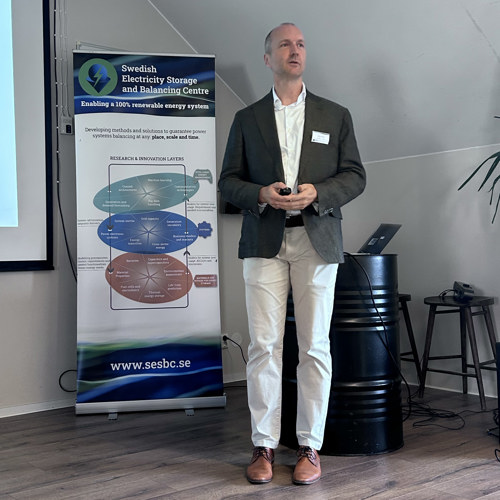Interview with Urban Lundin
Can you tell us a bit about yourself, Urban?
|
"I’m originally from Småland and moved to Uppsala to study. I’m a physicist by training and don’t have an engineering background. I’ve always been interested in energy-related issues, and after my postdoc I joined Mats Lejon’s research group at Uppsala University. In my spare time, I enjoy riding enduro motorcycles in the forest, or preferably in the Sahara or any other type of sand related terrain if I get the chance." |
 |
How are you involved in SESBC?
"I represent Uppsala University and lead two projects within the system layer. One is called Three Aspects of Balancing and focuses on storage capacity and flexibility at the system level that can be utilized by existing and new resources. The other is a project dealing with ultra-fast frequency regulation in the power grid. It’s a new frequency control resource that may emerge in a few years, and we’re currently in the process of testing hardware."
What do you see as the major research challenges in your field?
"I work a lot with hydropower, and one major challenge is the extremely long lifespan of components. A hydropower station is expected to last around 80 years. So how do you build hydropower that works well today and still meets needs far into the future? Will it be flexible enough to adapt to future demands? That’s the overarching question, though of course there are many details within it. Looking at the power system as a whole, many new opportunities are emerging, like vehicle-to-grid, but that also makes it more complex and harder to optimize. So we need a deeper understanding of the entire system, and that’s why it’s important that we work across research layers within the center. How does the system affect the components, and vice versa? The solutions you choose depend partly on the challenge, but also on your background. That’s why I’m passionate about bringing together people with different backgrounds, so we can look at things in new ways and maybe break some conventions."
What opportunities for collaboration do you see?
"There are definitely opportunities for collaboration, but the hard part is making it happen. Maybe we shouldn’t collaborate around a specific technology or problem, but rather toward a shared goal. If you look at major challenge-driven projects, like the moon landing, collaboration becomes essential to achieving the goal. It may be more difficult and costly, but also incredibly successful."